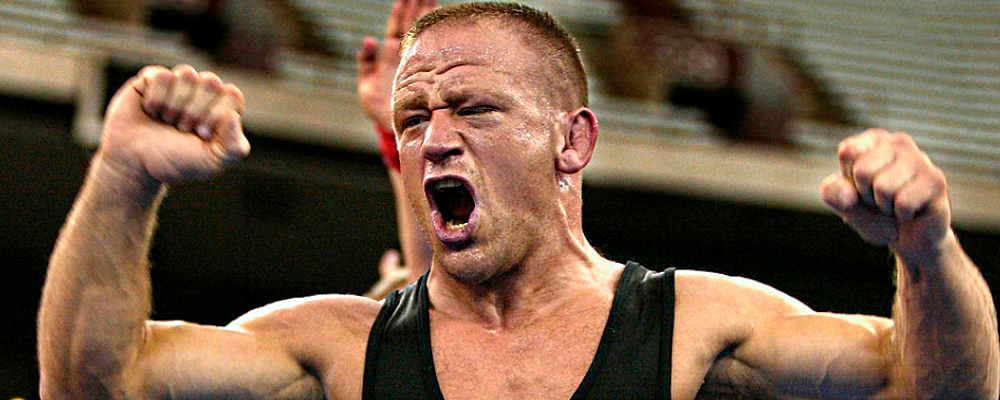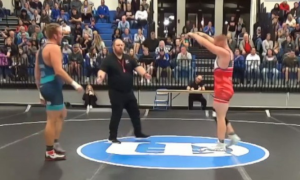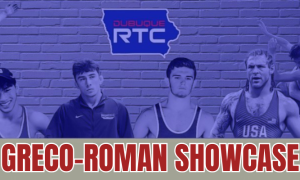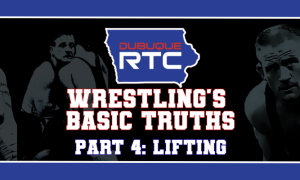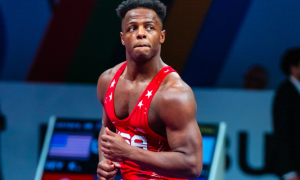Whenever you love something or someone, it is rare to go searching for flaws. Think about it. You are already in. There is no more selling which needs to be done. The qualities, attributes, or excitement that hooked you from the beginning are more than enough to sustain through the storms everyone knows will appear from time to time. Boats rock. Hills grow steeper. Branches fall. Lessons, learned. Then you move on. Clouds eventually part to reveal sunshine again, welcoming you back under the light that not long ago seemed so distant, you wondered if growing accustomed to the darkness was the safest choice. This has never been an option for Dennis Hall. He’s always searching for that light.
As a World Champion, Olympic silver medalist, and ten-time US National Champion, Hall could probably sit back with his feet up and throw out the occasional soundbite, maybe talk about how things unfolded “in his day”, teach a few clinics, cash a few checks, and then fade back into everyday life where the issues of the collective aren’t so within reach. That cannot happen for Hall. To him, this is STILL “his day.” It doesn’t matter if he walked away from competition years ago, Hall is as invested as ever in the health of Greco Roman wrestling and specifically, the US program, that he just can’t help himself. His love for Greco, entrenched by now in the seams of his DNA, pours out of him like so much water from a spring.
But that love, while perhaps unconditional in its makeup, has not shielded Hall’s eyes from witnessing what he perceives as “problems.” If anything, he sees a decent number of them. In this first of a two-part conversation, Dennis Hall talks candidly about some of the issues facing Greco Roman inside of the US, the role officials play, his star pupil Ben Provisor, and his all-new strength training program.
5PM Interview with Dennis Hall – Part I
5PM: You’ve been working with Ben Provisor since he was a kid. This is an athlete who has endured pretty serious injuries but healed up and looked great in Iowa City and then again last week. How do you think his preparation was heading into the Rio Olympics?
Dennis Hall: The last couple of years Provisor has been injured. A lot. So he hasn’t had much time on target as far as mat time. I knew it came down to habits. In his match at the Olympics, he missed at least six points on takedowns. He knocked the guy down and off balance three times and he didn’t score a point. You can’t leave those points on the table at the Olympic Games. I think Ben needs to develop a great front headlock, jump on the guy and front headlock him. The guy is going to give him two every single time because he doesn’t want to get choked. That was one instance we drilled at camp the week before he left because I knew he was going to knock guys down. But we didn’t get enough time drilling it.
5PM: How do you think he looked and performed physically?
Hall: Physically, there was no one in the world stronger than him at this tournament. No doubt about it. He did all of the things he needed to do to prepare his body physically. If you saw the match, the other guy could barely stand up. But part of it is, if he had went down in par terre instead of looking around and complaining that second time, if he had just went down in par terre immediately and forced that guy to get on as quick as possible, I don’t know if he would have gotten turned. Because that guy wound up getting a good :20 break.
5PM: Either way, considering his injuries and all that, his turnaround from the last couple of years, even from the end of 2015, was pretty evident at the Olympic Trials. What was his training centered around to help him rehab and get in shape?
Hall: A different training program. It’s a training program that me and a buddy put together. Ben came up to me in January after he left Colorado Springs and wanted a place to train. He came up with an open mind, so we started him on this functional strength training program my buddy and I developed and he bought into it 100%. You could ask him, the biggest difference in Ben’s training right now is the strength program we had him on.
5PM: How did you get involved with the formation of this program that Provisor used?
Hall: It came out of my frustration from watching kids in practice break over and over again and not be able to hold position because their bodies aren’t put together. I was good friends with Joel Berens, who was my partner in developing this core program. So I went to Joel and asked him, “Could you come down to one of my practices and see my frustration in how hard it is to teach these kids how to wrestle?” So he came to a practice during the time when these kids were in position. This was to see how long they could keep position without breaking. It was maybe about a minute where they were in great position. He looked at it and said, “I can see. You need help.” So we started a process maybe around two years ago where he just started asking me questions about how I built my body for Greco. And a lot of stuff was based on holding position. Pushing against walls, walking around the mat with my toes pointed out, my hips out, and my chest up. I did a lot of holds in par terre to strengthen my shoulders. I’d have guys squeezing around my rib cage and try to pull me off the wall while my hands are on the wall. Just a lot of different things I picked up from foreigners. Joel was a placekicker and he probably would have been in the pros. He had contracts from San Diego, Seattle, and Oakland for placekicking. He had to know his body because if the snap is off two inches, he had to change mid-kick. He had to learn how to adjust his weight and control his body well.
We put together all of the information we used from our sports and did a lot of research. The more research we did, the more we figured out the overall strength training program. A lot of the stuff we do is the way gladiators used to train. There was one story that we read where the gladiators at a certain training school would wake up in the morning and push against a tree for 13 hours. And if you fell, you’d get your head chopped off because you’re going to die in battle anyway. We don’t go to that extent, but the program we’ve developed has helped Provisor tremendously. I’ve got guys in my youth club who used to have trouble getting out from the bottom and now they are able to move better, stronger, and are able to get out easier. The concept is that we want to attack the slow-twitch muscle fibers and get those to engage. Keep those on and then work out the whole body.
5PM: Have you participated in this program?
Hall: Yeah, it’s great. I try and do it four to five times a week. This summer with all my camps and stuff, I haven’t been on it like I should. This week, I’ll get back on it. I love it, my body feels great. I’m 45 years old right now and I feel how I felt in my mid-20’s in my overall functional strength. My body feels great and a lot of that is due to simplifying my training methods to build the functional strength and good core strength. I mean, Provisor is lucky. I had to search and get my butt whupped on for how many years figuring this stuff out. I know Team USA Coach Matt Lindland is definitely interested in the program and asked us to send him a lot of our information on it so he can share it with the strength and conditioning coach. He wants to get them on board so he can use the program and he’s doing his homework. He’s smart. So hopefully, the strength and conditioning coaches get it. If you use it, you’ll get stronger, it’s pretty simple.
5PM: For Provisor, it wasn’t a strength issue, or at least not just that, right? It had to have served some kind of rehabilitative purpose, too, I’d imagine.
Hall: Yes. Right now, we’ve got an office down at a chiropractor’s office in Stevens Point. We’re having people coming into our facility. We had a 50-year old man with stenosis, which is a narrowing of the spine where the nerves come out, and he hadn’t went fishing for over five years. Within a month of doing the program he has been out fishing, he’s able to hold a chainsaw in his hands. He wouldn’t have even attempted that before. It is good for rehabilitation. We know how to target any muscle in the body to stimulate it and get it firing. There isn’t a muscle in the body that Joel can’t find. The great part about that is we get to the deep-tissue muscles along the spine, and those are used for stabilization. And when they get engaged right away, it only takes up 15% of your oxygen, compared to when your fast-twitch muscles are engaged to hold you up for stability. So it’s 15% to 85% oxygen use, you’re going to see results in your shape and how you are breathing.
5PM: Then while this might be good for Greco training, or wrestling training in general, it would be useful for other sports, as well.
Hall: Our core program is starting to spread out to other sports. We’ve got hockey players, track and field athletes, gymnasts. Gymnasts are really finding a lot of success with it because they are learning their bodies better. Everybody who has done the program has said they are learning their bodies. They say that they are more aware. They say they don’t know how to explain it any other way. All of these athletes who are using this program, they are learning their bodies and able to control them better. We have a girl who plays volleyball and has a full ride to the University of Wisconsin. She’s a junior in high school. Her kill rate was 250, now it’s up to the high four’s. Her placement of her spikes is a lot better and more controlled. We’re getting really, really good results. We have a football team using our program up in Stratford,Wisconsin and the coach is putting his kids through a 20 minute workout because he sees the value of the program and he loves it.
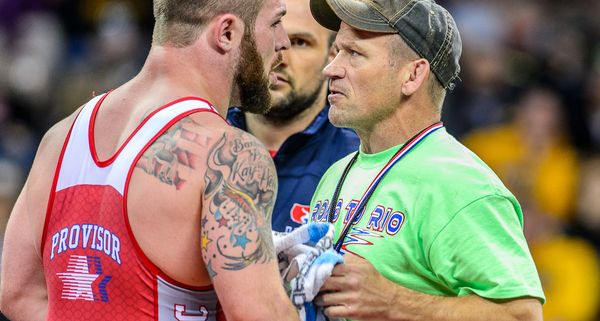
Hall (right) talking to Provisor in between periods at the 2016 Olympic Trials. (Photo: Stevens Point Journal)
5PM: This is a two-part question. What do you think is going right with Greco in this country? And the flipside, what do you think is going wrong? Start by answering the first part.
Hall: What do I think is going right with Greco in this country? Not much at this point. We need to revamp it, we need a lot of work. We need different training methods. I think everybody thinks we need to go overseas all the time to get the training and be coached by those guys over there. My philosophy when I competed was to bring foreigners here so our guys aren’t over there for three months at a time. Because the only way you’re going to be able to defend the lift is by having a guy on top of you day in and day out fixing the problem. I think we should be having guys coming over here for three month periods and then you go overseas and you test to see if it’s gotten better. Another part of our problem in this country? Not enough people wrestle Greco. We’ve got good youth participation, but it’s one or two months wrestling Greco. The other nine months is wrestling folkstyle. You cannot compete with the rest of the countries having Greco run this way.
5PM: Yeah, but which is more economically feasible? Isn’t it easier for the US to send people over there? Or is it better financially for our guys to bring them over here?
Hall: What’s a plane ticket cost? A plane ticket is $1000, $1,500? You might have to pay them a little bit or give them a stipend or whatever to make it worth their time. If you go over there for a three month period and you’re staying over there in a hotel, you have to pay the same bills. To me, it’s more economical bringing a guy over. House them in your house. We’ve got enough houses in the United States where guys can find people and the houses for them to stay at.
5PM: What if they were put up at like a motel or something? There’d probably be deals for that I’d imagine.
Hall: They’ll stay at the houses. Every one of my partners stayed at my house.
5PM: You pretty much didn’t say anything positive (laughs).
Hall: You want me to really get into it?
5PM: Yes, obviously.
Hall: Okay, we’ll (expletive) go there. Part of the problem with Greco in the United States is that the administration, I don’t believe, has Greco’s best interests for the United States. Until the administration gets on board and realizes that there is a real problem and that our funding is way too low, even though people think funding is high or decent for Greco. The problem is, is how many colleges in the country have freestyle programs?
5PM: No idea. A lot of them I guess.
Dennis Hall: A lot of the major colleges let them wrestle freestyle.
5PM: Well a lot of them have freestyle wrestling clubs attached.
Hall: Exactly, they have clubs. And that is my point. These guys are able to stay where they went to college or move and go to different training centers…they have options. In the US for Greco, we don’t have options. And when you look at the funding, okay, how many clubs support Greco wrestling in the United States?
5PM: I don’t know, a few.
Hall: There’s Minnesota Storm and NYAC. In freestyle, you’ve got a ton of them. The universities have their clubs and then there are the major wrestling clubs, Titan Mercury, Sunkist, NYAC, all the different big wrestling clubs. That is part of the problem. We aren’t getting the help we need financially to make that jump to the next level.
5PM: Then why isn’t Greco getting that help it needs financially to reach the next level?
Hall: Why aren’t we? That’s a damn good question. I mean, I’ve been asking that question forever. Art Martori from Sunkist, when I was wrestling for Sunkist, he did a great job and always helped me out a ton. But you know what? He got medals from me, you know? I think if we have more guys who are willing to fly a guy in from overseas and someone to take some of the burden off of the athletes so they don’t have to go out and get a regular job just to be able to train full-time, it’d make a huge difference.
5PM: Yeah, but that is something that has been said a lot. Funding is something that is intertwined with the actuality of earning medals. Is that not correct?
Hall: It is. But then my question to you, or anyone else out there who asks that, is this: We only get so much funding from the USOC because of medal performance, okay? If you have a part of your company that isn’t doing well, are you going to ignore the problem, or are you going to get rid of the problem? Or are you going to invest in the problem so you can fix it and make it a better part of the company?
5PM: Do you think there is a bias against Greco in this country?
Hall: Do I think so?
5PM: Yes, do you think so.
Hall: For sure.
5PM: Okay, would you care to elaborate?
Hall: I mean, you’ve got a ton of people, just average fans in the US, who have no clue how many countries have good Greco teams. Sweden, Finland, Denmark, Norway all have good teams. Now I don’t know how many medals they got this year or not, but traditionally, they’re pretty strong. They’ve won a lot of medals at the Worlds and the Olympics. Even France has been traditionally strong. I don’t know. I know their freestyle program isn’t as strong. You’ve got a lot of countries who are usually strong but don’t have much for freestyle. So what you have is that the competition for Greco is a whole lot deeper overseas. Plus, the other thing is, in the United States we’re brought up attacking legs in kindergarten or even Pre-K. So right off the bat, the parents see the folkstyle and then they see a throw and they may not like it because they think their kid is going to get hurt. Well, if a coach is properly teaching Greco or any other upper-body techniques, you’re not going to have those issues. But the problem is in the US, we don’t have enough knowledgeable people out there to propel Greco.
5PM: This would seem to go part and parcel with the whole folkstyle debate, which has picked up steam on this site and elsewhere. But as I brought up to Coach Lindland, there have been college guys who have performed well internationally and have split their time. Other coaches have also mentioned that.
Hall: Guys have to do what they have to do to set themselves up for the rest of their lives. So yeah, some of the athletes have wrestled in college. I have no problem with a guy wrestling in college. But you know what? I do have a problem when a lot of the colleges out there don’t want their guys to wrestle Greco in the off-season and tell them to wrestle freestyle because it’s going to help with their folkstyle. And that is part of our problem in America. We have had a lot of killer athletes wrestling in college that would want to wrestle Greco, but their college coaches won’t support it. Now I get that they’ve got their own jobs and have to protect themselves. But at the same time, how do you expect Greco Roman in the United States to get any better if the athletes who want to wrestle Greco can’t because they are forced to wrestle freestyle?
5PM: If a college coach is afraid of letting their guys compete, there doesn’t seem to be a lot recourse.
Dennis Hall: They’re not afraid! They are not afraid to let their guys wrestle Greco. They want their guys to wrestle freestyle because it translates better to folkstyle. It’s not about being afraid. They are serving their own interests, not the interests of their athletes.
5PM: Okay, fine, then what do you have to say to potentially convince them that Greco won’t hurt their folkstyle careers?
Hall: Number one, the staff at USA Wrestling needs to get into a lot of these college programs. They need to have a coach who can go in there and teach for the guys who would choose to wrestle Greco. That their guys are being taught how to defend the gutwrench and how to wrestle Greco better. I know Terry Brands said he’d appreciate any of the Greco coaches coming into his room. He’s got guys who have won Junior national titles on his team right now who wrestled Greco, but he can’t get them to wrestle Greco because they are afraid they’re going to be behind.
5PM: There are athletes who do wrestle Greco throughout their entire college careers, though they are basically all at Northern Michigan. So what we’re coming to now is a segment of wrestlers who do pass by the ones who say, were champions at Fargo but have gone onto college and now they’ve turned away from Greco. They are reluctant to go back to it because they know that if they do, they are too far behind athletes like the roster from Northern.
Hall: I mean, they’d be able to compete nationally. So they’d take a couple of lumps, it’s not a big deal. You know what? There are guys who compete at the DI level, like Gadson from Iowa State, he could do a great job wrestling Greco. I don’t know why he’s wrestling freestyle. You’ve got Gabe Dean from Cornell, a really good Greco guy. We have the guys, we need to get them to buy in. But part of it is these guys are afraid to commit after they’re done because they see of a lack of success by our team. But it’s a vicious cycle. And until we have success in the United States, we’re going to continue to have guys who are afraid of trying Greco.
5PM: You’ve owned and operated a successful wrestling school for a long time. How do you indoctrinate kids into Greco who are unfamiliar with it?
Hall: Every kid in my room will learn some throws. We do throws. On Thursday nights, we have a practice where we don’t touch legs. We learn how to hand-fight, we learn how to underhook, we learn how to do two-on-one’s. You learn how to throw, we’re on the crash pad. But as far as teaching Greco Roman, our Greco season is way too short in the United States for youth. The postseason nationals in Cedar Falls, Iowa is the first weekend in April, so how do kids go down to that? Well, our state tournament is one month later for freestyle and Greco and then you wonder why we’re struggling? And it’s the same thing for freestyle, they need more time wrestling freestyle. There is a whole different skillset you learn wrestling freestyle or Greco that you can’t get in folkstyle.
5PM: Is there a benefit in or whatsoever to folkstyle that translates into Greco? Like I alluded to, there are plenty of coaches out there who believe that there is.
Hall: For me? I think the level change is huge. I think in the United States we don’t change our levels enough for Greco and that leads to less scoring on our feet. We’ve got to do what worked for us when we were growing up. Everybody knows how to do a heel-toe-knee penetration for your double or your high-crotch. Translate that to your slide-by’s and taking an angle underneath on the body. That is one area we really need to improve.
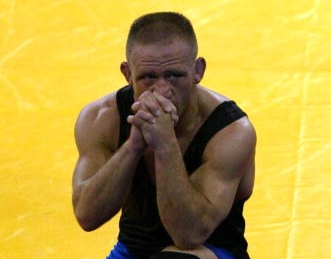
Dennis Hall made his third Olympic Team in 2004. (Photo: Donald Miralle)
5PM: You watched a lot of the Olympics.
Hall: Yup.
5PM: We got to see some pretty poor officiating, to say the least. And not just on the US side of things, but for wrestlers from elsewhere, as well.
Hall: When the referee can dictate the outcome of a match by calling a guy for passivity, there is a problem with the rules. Until they fix the rules and stop awarding points for passivity, you’re going to keep having that type of behavior because an official can influence a match. And who knows what goes on behind the table, behind close doors, between officials and coaches? You might think I’m nuts, I don’t really care. I know that there’s stuff that has gone on in the past. But until we fix that problem, giving the power to decide a match in the official’s hands, (until) we take that away, it’s going to keep happening.
You know, I hear there is talk about par terre being taken out of Greco Roman wrestling. I’m okay with it. But what I’m not okay with is them giving points for guys stalling, because that is just going to lead to more corruption.
5PM: The concept of passivity isn’t a bad one. The problem is that ultimately, it’s subjective.
Hall: When a guy is a foot taller and they’re telling you to get your head up, like they did to Provisor, I find it absolutely ridiculous. He moved forward the entire match for six minutes, that guy didn’t even get on the mat with him. And you know what? There’s bias.
5PM: If there is bias, why is there a bias? Why is there a prejudice against US Greco Roman wrestling?
Hall: Okay. This is my take on it. They see our system of wrestling in the United States. What is our system of wrestling?
5PM: It’s a folkstyle system.
Hall: Folkstyle. Okay, what does folkstyle resemble the most?
5PM: I should think freestyle.
Hall: Yes. Right there is your bias. They think we do Greco Roman as a hobby. They know our guys at the Senior level train. But they don’t want to lose to somebody who has only been training Greco for four, six years when they have been doing it a lifetime. You might think I’m nuts, I don’t know.
5PM: Fine. But okay, even in situations where there isn’t say, nefarious activity, you still think there is a predisposition that …
Hall: We’re going to get the short hand of the stick on 90% of the calls.
5PM: So if you want to see par terre eliminated…
Hall: I don’t care one way or another. But what I don’t like is that they can award a point in the match for a guy being passive and decide the match. Which happens right now on the second passivity call, is that correct?
5PM: Second you go down, third is a point and you go down.
Hall: Exactly. If you want to put somebody down ten times, put them down ten times. We just got to get better defensively.
5PM: Well that’s a point no one has made yet, not in that way. If you’re going to perceive the US’s weakness as defending from par terre, then in theory, what difference does it make anyway? Instead of awarding points during questionable situations, you could just put them down and make them defend.
Hall: Yeah. I mean, that’s pretty much what they do. We get put down more than any other countries and I can tell you, we don’t stall more than any other countries. I got put down more in my career than my opponents and you know what? I don’t believe I was stalling more than my opponents. It’s ridiculous. Watch the tapes of the 1996 Olympics and I was put down more than my opponents.
5PM: And that was on home soil.
Dennis Hall: On home soil. I’m just saying we get put down more in par terre than our opponents and I don’t believe we are stalling more. We’re attacking, our heads are up, and we’re banging. The problem is that they don’t like the way we hand-fight on our feet, so they assume we’re passive. And the reality is, we’re just trying to get to the guys’ bodies because we do a lot more snaps more than the foreigners. The foreigners are two-on-ones and an underhook. So why we get warned for passivity is because we’re pulling on them and we snap the head, right underhook, and then we pull back on it. We’re changing off our ties more, I guess.
5PM: If we’re going to use the current context as a lead point here, you look at Ben, who pushed his guy around the entire time. He beat the guy up. You had (Andy) Bisek, a two-time World medalist who always attacks, going up against a guy who is good, but probably someone he should have beaten. And then Bisek gets put down in the second period, even though he was moving him off his center. So it just doesn’t seem speculative anymore. It doesn’t seem imagined. We’re not past this.
Hall: I mean, people can say what they want about United States Greco. We’ve got a lot of guys who wrestled for a lot of years and every one of us will say the same thing: We were at a disadvantage stepping on the mat. I can go from match to match for a lot of people, guys who wrestled Greco for seven or eight years at the international level, and I guarantee every one of them will say we got put down a lot more than the foreigners. And I’m not complaining. We’ve just got to get better at our defense. But at the same time, I don’t like it that a ref can control a match, and they control matches right now by awarding points. You could speak to what I’m complaining about, there was a finals match, the Serb at 66 kilos and the Armenian.
5PM: Oh, Stefanek and Arutyunyan.
Hall: For sure. How does Stefanek win that Olympic title when he didn’t score a point? The Armenian got a push-out on a legitimate attack and then Stefanek gets a caution for passivity for one point. How is that even legal? Now you see my problems with the way they call things?
5PM: Well that one was completely egregious. A remarkable example.
Hall: You had the Armenian who took second in the Olympics saying he never wants to wrestle again. That should tell you that there are problems in our sport. And I’m not saying that because I don’t like our sport. I want our sport fixed and cleaned up so that doesn’t happen to somebody who worked their entire life to win a match like that. And the sad part is, it goes on everywhere. Not only overseas, but in the United States. The referees dictate outcomes of matches.
5PM: Is there a way to take that element out of it so a referee cannot assume that much control?
Hall: Yeah, don’t award points for passivity! Make the guys wrestle. I mean, shit, we used to have to wrestle for nine minutes if you didn’t have three points scored. Just make it so that a guy has to score a legitimate point, whether it’s a step out on their attack, or a takedown, or a gutwrench. Keep par terre in, but take away the points that are being awarded by referees because that is where I think it gets bad. And our leaders at USA Wrestling have to do a better job understanding where the coaches are coming from within the United States Greco program and try and get these rules to where they aren’t against us from the start. If you want to put me down five times, I’ll go down five times in a match. But don’t give a guy a point for doing absolutely nothing.
5PM: Right, so in a case where a match is 1-1, 2-2, or whatever…
Hall: Let the wrestlers decide it.
5PM: Chances are if a match is that close, there isn’t a ton of opening up going on anyway.
Hall: Oh, they might be opening up. Both guys might be wide open, it’s just that everybody’s defense is so solid, you know?
5PM: Then if they take par terre out, I would tend to believe there would still have to be a mechanism in play for passivity. It might not be the same exact system, but something to encourage.
Hall: That’s why I think par terre needs to be involved. Otherwise, they’re going to do something crazy and they are going to find other ways to rip guys off. That’s just my personal opinion. But you could ask every guy who wrestles Greco for the United States and they’d all probably say the same thing. You’re going to get some matches where it’s 0-0 at the six minute mark and they’re hand-picking a winner. When you’re wrestling the best guys in the world, man, it’s going to be a tight match. You never know. Both guys are going to try. You mean to tell me one guy says, “I’m not going to try and score in match?” No!
5PM: You’re a good example because you make up one half of the greatest match in the history of the country. There should be some kind of sudden death or something, no? That is the finalization of a bout people seem to need.
Hall: Somebody is going to break. Somebody is going to break. If it takes ten minutes, it takes ten minutes. How exciting would that be to watch an Olympic final where a match is 20 minutes long and both are attacking? Guys will find ways to score. And talk about a 0-0 match, (Brandon) Paulson and I had three points on the board at the six minute mark because everything else was tied. That’s why we ended up going 17 (minutes), because they didn’t want to pick the winner. They made the right call.
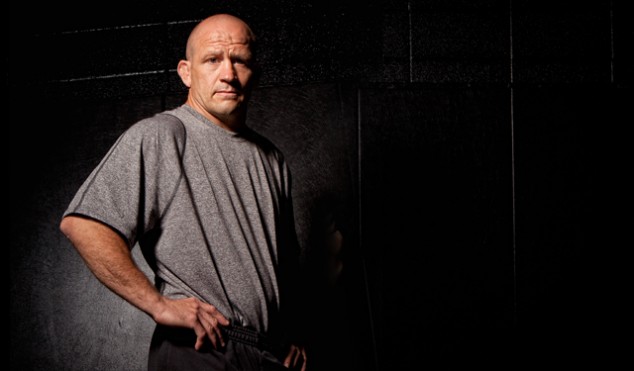
Hall is one of the founders of World Wrestling Resource, an online wrestling instructional library.
5PM: Let’s drift back a bit now. You had a very successful Junior career, went to college, and then kind of took an alternative route.
Hall: Well I made my first World Team when I was 19 and the NCAA wouldn’t give me a semester off so I could go compete at the Worlds. So I had a choice, which was go to the World Championships that I earned the right to compete in, or be done with college. It was a no-brainer.
5PM: Coming off making that World Team and then concurrently deciding to leave school, was your confidence level high in that you knew it was what you were going to need to do at the international level?
Dennis Hall: I knew I wasn’t going to give up my right to represent my country because the NCAA wasn’t going to allow me to take a semester off. I would’ve missed six weeks of classes and been ineligible because I’m not good enough to where I could have done the work on the road. It wasn’t looked upon. Another thing that helped make my decision easier is that I was at the University of Wisconsin. When I signed my letter of intent I had Dave Schultz on the coaching staff, I had John Acevedo and Andy Rein — all three of them were Olympians. When I got to college my freshman year, I only had Andy Rein on the staff and they had Brad Lloyd. Brad would spend time with me and help me out, but he was a 197 pounder I believe in college. But he helped me out the most my freshman year. So it was an easy decision. I wanted to have a lightweight coach in the room to beat the heck out of me everyday and I didn’t have one. So when they didn’t have the coach I signed up for in Acevedo, I was like, You know what? If you guys don’t want to help me win a national title, I’ll go try and win a World or Olympic title.
5PM: While you spent that year or so in college, was your drive singular?
Hall: No, man. Paul Walker, he wrestled for the Badgers, he’s down in Florida right now. But he was around on the Greco circuit. He helped me out a ton. A lot of times we’d train together and we would wrestle upper-body during practice. Because I decided I was red-shirting after the first semester of college and then Paul and I would pretty much train Greco. We’d come in at different times and work out. It was just nice to have a guy who knew how to defend gutwrenches and knew all the ties. He was one of my coaches I trusted, and he helped me a ton.
5PM: Do you think your career would have turned out the way it did had you completed four years of school?
Hall: I have no idea. I don’t know. I mean, I’m just being honest. I think it would have taken me longer to get to where I was at the Greco level, for sure. If I would have even chose Greco. If I had stayed in college, my focus would have been on trying to win the NCAA’s, and by trying to win the NCAA’s you end up getting sucked into the freestyle mode. And that was one thing about my college coach, he let me do Greco. So that was pretty cool that Andy Rein allowed me to do Greco in the off-season. He didn’t push me to do freestyle, he let me make the decision. I mean, you’ve got guys like Sammie Henson, he won his first Senior-level national title in Greco. But he ended up wrestling in college and wound up going into freestyle mode. And it worked out for him. Whatever style is in your heart is the one you’ve got to chase.
Be sure to stay tuned for Part II of our interview with Dennis Hall next week as he delves further into his career, including each Olympic performance, the unforgettable battle with Brandon Paulson, and much more!

Notice: Trying to get property 'term_id' of non-object in /home/fivepointwp/webapps/fivepointwp/wp-content/themes/flex-mag/functions.php on line 999

